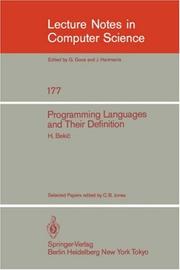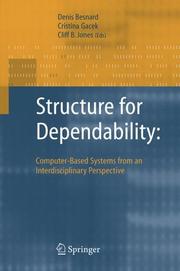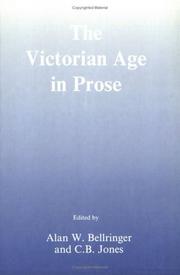| Listing 1 - 10 of 13 | << page >> |
Sort by
|
Book
ISBN: 9781138642539 Year: 2016 Publisher: London : Routledge,
Abstract | Keywords | Export | Availability | Bookmark
 Loading...
Loading...Choose an application
- Reference Manager
- EndNote
- RefWorks (Direct export to RefWorks)
English literature --- English literature. --- LITERARY CRITICISM --- Radicalism in literature. --- Radicalism in literature. --- Sentimentalism in literature. --- Sentimentalism in literature. --- History and criticism --- European --- English, Irish, Scottish, Welsh. --- 1700-1820. --- Great Britain --- Great Britain. --- History

ISBN: 354013378X 3540389334 Year: 1984 Volume: vol 177 Publisher: Berlin Springer
Abstract | Keywords | Export | Availability | Bookmark
 Loading...
Loading...Choose an application
- Reference Manager
- EndNote
- RefWorks (Direct export to RefWorks)
Programming --- 681.3*D31 --- 681.3*F3 --- Formal definitions and theory: semantics; syntax (Programming languages)--See also {681.3*D21}; {681.3*F31}; {681.3*F32}; {681.3*F42}; {681.3*F43} --- Logics and meanings of programs (Theory of computation) --- 681.3*D31 Formal definitions and theory: semantics; syntax (Programming languages)--See also {681.3*D21}; {681.3*F31}; {681.3*F32}; {681.3*F42}; {681.3*F43} --- 681.3*F3 Logics and meanings of programs (Theory of computation) --- Computer science. --- Logic design. --- Mathematical Logic and Formal Languages. --- Programming Languages, Compilers, Interpreters. --- Logics and Meanings of Programs. --- Design, Logic --- Design of logic systems --- Digital electronics --- Electronic circuit design --- Logic circuits --- Machine theory --- Switching theory --- Informatics --- Science --- Programming languages
Book
Abstract | Keywords | Export | Availability | Bookmark
 Loading...
Loading...Choose an application
- Reference Manager
- EndNote
- RefWorks (Direct export to RefWorks)

ISBN: 1846281113 1846281105 Year: 2006 Publisher: London : Springer,
Abstract | Keywords | Export | Availability | Bookmark
 Loading...
Loading...Choose an application
- Reference Manager
- EndNote
- RefWorks (Direct export to RefWorks)
This book breaks new ground by presenting an interdisciplinary approach to a crucial problem – system dependability. Computer-based systems include hardware, software and people. Achieving dependability for such systems requires an interdisciplinary approach. In Structure for Dependability: Computer-Based Systems from an Interdisciplinary Perspective, computer scientists, sociologists, statisticians and psychologists bring together their latest research on the structure of dependable computer-based systems. The result is a highly readable overview of ways to achieve dependability in large computer-based systems with practical advice on designing dependable systems. Work on structure for dependability has usually come from a single discipline and has been concerned only with the computer systems. Stakeholders and system designers now agree that human and social issues cannot be separated from technical matters. The approach taken in this book demonstrates that interdisciplinarity delivers real benefits in the design and deployment of complex computer-based systems. This book is one of the outcomes of a six year Interdisciplinary Research Collaboration. Topics covered include fault tolerance, system evolution, determining software specifications, HCI, architecture, certification, dependability arguments, organisations, diagrams, time and procedures. System developers, stakeholders, decision makers, policymakers and researchers will find this book a unique resource which highlights the core issues for all those involved in improving dependability in complex computer-based environments. .
Computer science. --- Software engineering. --- Computers. --- User interfaces (Computer systems). --- Computers and civilization. --- Computer Science. --- Computer Science, general. --- Software Engineering. --- Models and Principles. --- Information Systems Applications (incl. Internet). --- User Interfaces and Human Computer Interaction. --- Computers and Society. --- Reliability (Engineering) --- Human-computer interaction. --- Computer software engineering --- Engineering --- Computer-human interaction --- Human factors in computing systems --- Interaction, Human-computer --- Human engineering --- User-centered system design --- User interfaces (Computer systems) --- Reliability of equipment --- Systems reliability --- Maintainability (Engineering) --- Probabilities --- Systems engineering --- Plant performance --- Safety factor in engineering --- Structural failures --- Information Technology --- Computer Science (Hardware & Networks) --- Informatics --- Science --- Application software. --- Civilization and computers --- Civilization --- Interfaces, User (Computer systems) --- Human-machine systems --- Human-computer interaction --- Application computer programs --- Application computer software --- Applications software --- Apps (Computer software) --- Computer software --- Automatic computers --- Automatic data processors --- Computer hardware --- Computing machines (Computers) --- Electronic brains --- Electronic calculating-machines --- Electronic computers --- Hardware, Computer --- Computer systems --- Cybernetics --- Machine theory --- Calculators --- Cyberspace
Book
ISBN: 9783540752202 354075220X 3540752218 Year: 2007 Publisher: Berlin, Heidelberg : Springer Berlin Heidelberg : Imprint: Springer,
Abstract | Keywords | Export | Availability | Bookmark
 Loading...
Loading...Choose an application
- Reference Manager
- EndNote
- RefWorks (Direct export to RefWorks)
Formal methods (Computer science) --- Real-time data processing --- Méthodes formelles (Informatique) --- Temps réel --- Congresses. --- Congrès --- Björner, D. --- Zhou, Chaochen, --- Computer Science --- Engineering & Applied Sciences --- Information Technology --- Software Engineering --- Bjørner, D. --- Bjørner, Dines --- Bjørner, Dines, --- Chaochen, Zhou, --- Computer science. --- Computer organization. --- Software engineering. --- Computer logic. --- Mathematical logic. --- Computer Science. --- Software Engineering/Programming and Operating Systems. --- Software Engineering. --- Logics and Meanings of Programs. --- Computer Systems Organization and Communication Networks. --- Mathematical Logic and Formal Languages. --- Algebra of logic --- Logic, Universal --- Mathematical logic --- Symbolic and mathematical logic --- Symbolic logic --- Mathematics --- Algebra, Abstract --- Metamathematics --- Set theory --- Syllogism --- Computer science logic --- Logic, Symbolic and mathematical --- Computer software engineering --- Engineering --- Organization, Computer --- Electronic digital computers --- Informatics --- Science --- Logic design. --- Computer network architectures. --- Architectures, Computer network --- Network architectures, Computer --- Computer architecture --- Design, Logic --- Design of logic systems --- Digital electronics --- Electronic circuit design --- Logic circuits --- Machine theory --- Switching theory --- Chaochen, Zhou. --- Computer engineering. --- Computer networks. --- Machine theory. --- Computer Science Logic and Foundations of Programming. --- Computer Engineering and Networks. --- Formal Languages and Automata Theory. --- Abstract automata --- Abstract machines --- Automata --- Mathematical machine theory --- Algorithms --- Recursive functions --- Robotics --- Communication systems, Computer --- Computer communication systems --- Data networks, Computer --- ECNs (Electronic communication networks) --- Electronic communication networks --- Networks, Computer --- Teleprocessing networks --- Data transmission systems --- Digital communications --- Electronic systems --- Information networks --- Telecommunication --- Cyberinfrastructure --- Electronic data processing --- Network computers --- Computers --- Distributed processing --- Design and construction
Book
ISBN: 0132840278 9780132840279 Year: 1989 Publisher: New York, NY : Prentice-Hall International,
Abstract | Keywords | Export | Availability | Bookmark
 Loading...
Loading...Choose an application
- Reference Manager
- EndNote
- RefWorks (Direct export to RefWorks)
Electronic data processing --- Computers --- Computers. --- Electronic data processing.
Book
ISBN: 9780874715545 0874715547 Year: 1975 Publisher: London: Dent,
Abstract | Keywords | Export | Availability | Bookmark
 Loading...
Loading...Choose an application
- Reference Manager
- EndNote
- RefWorks (Direct export to RefWorks)

ISBN: 9051830505 Year: 1988 Publisher: Amsterdam Rodopi
Abstract | Keywords | Export | Availability | Bookmark
 Loading...
Loading...Choose an application
- Reference Manager
- EndNote
- RefWorks (Direct export to RefWorks)
Book
ISBN: 1450387314 9781450387316 Year: 2021 Publisher: San Rafael : Morgan & Claypool Publishers,
Abstract | Keywords | Export | Availability | Bookmark
 Loading...
Loading...Choose an application
- Reference Manager
- EndNote
- RefWorks (Direct export to RefWorks)
Sir Tony Hoare has had an enormous influence on computer science, from the Quicksort algorithm to the science of software development, concurrency and program verification. His contributions have been widely recognised: He was awarded the ACM's Turing Award in 1980, the Kyoto Prize from the Inamori Foundation in 2000, and was knighted for "services to education and computer science" by Queen Elizabeth II of England in 2000. This book presents the essence of his various works--the quest for effective abstractions--both in his own words as well as chapters written by leading experts in the field, including many of his research collaborators. In addition, this volume contains biographical material, his Turing award lecture, the transcript of an interview and some of his seminal papers.
Book
ISBN: 9004657509 Year: 1988 Publisher: Amsterdam : BRILL,
Abstract | Keywords | Export | Availability | Bookmark
 Loading...
Loading...Choose an application
- Reference Manager
- EndNote
- RefWorks (Direct export to RefWorks)
| Listing 1 - 10 of 13 | << page >> |
Sort by
|

 Search
Search Feedback
Feedback About UniCat
About UniCat  Help
Help News
News